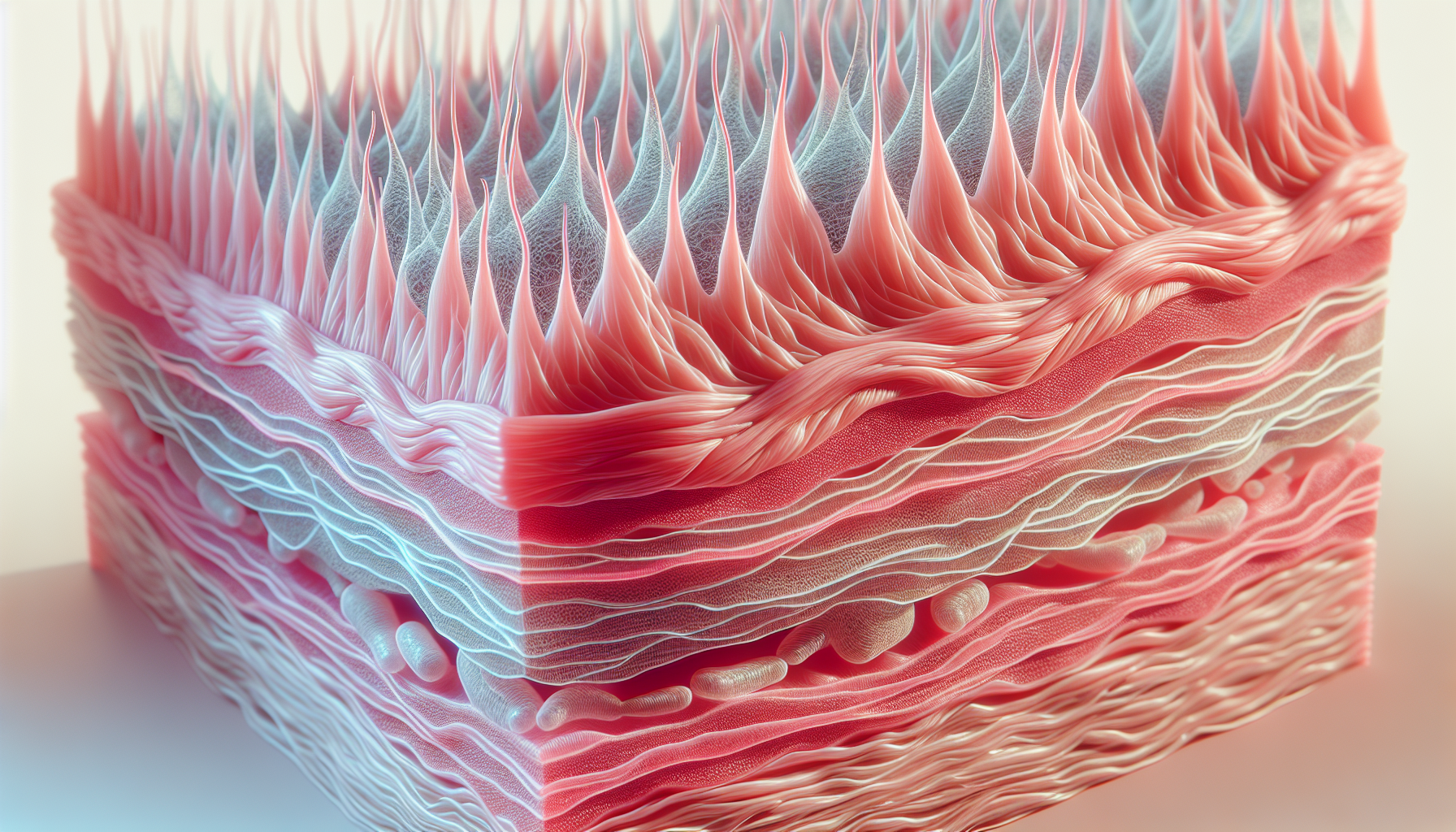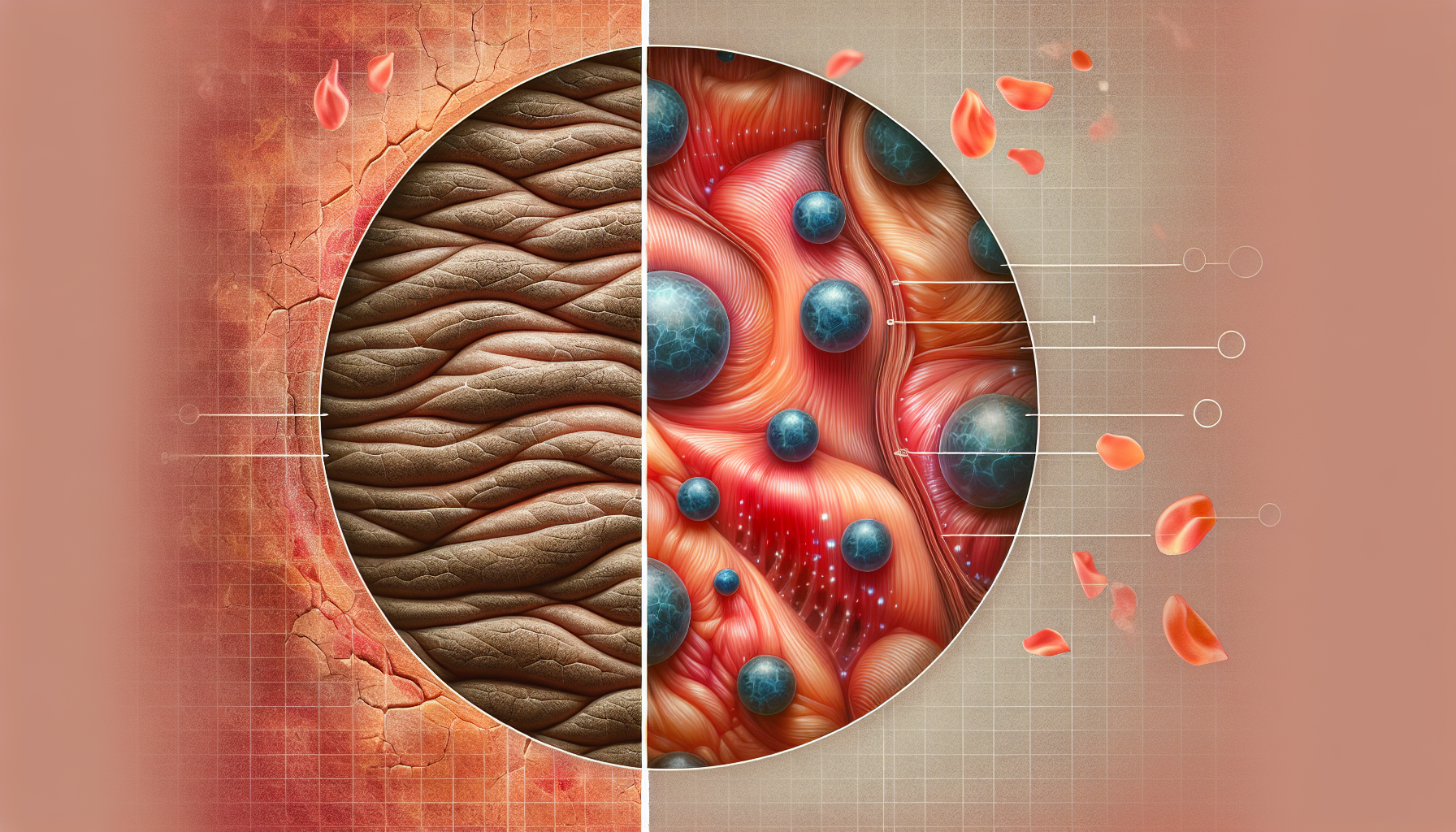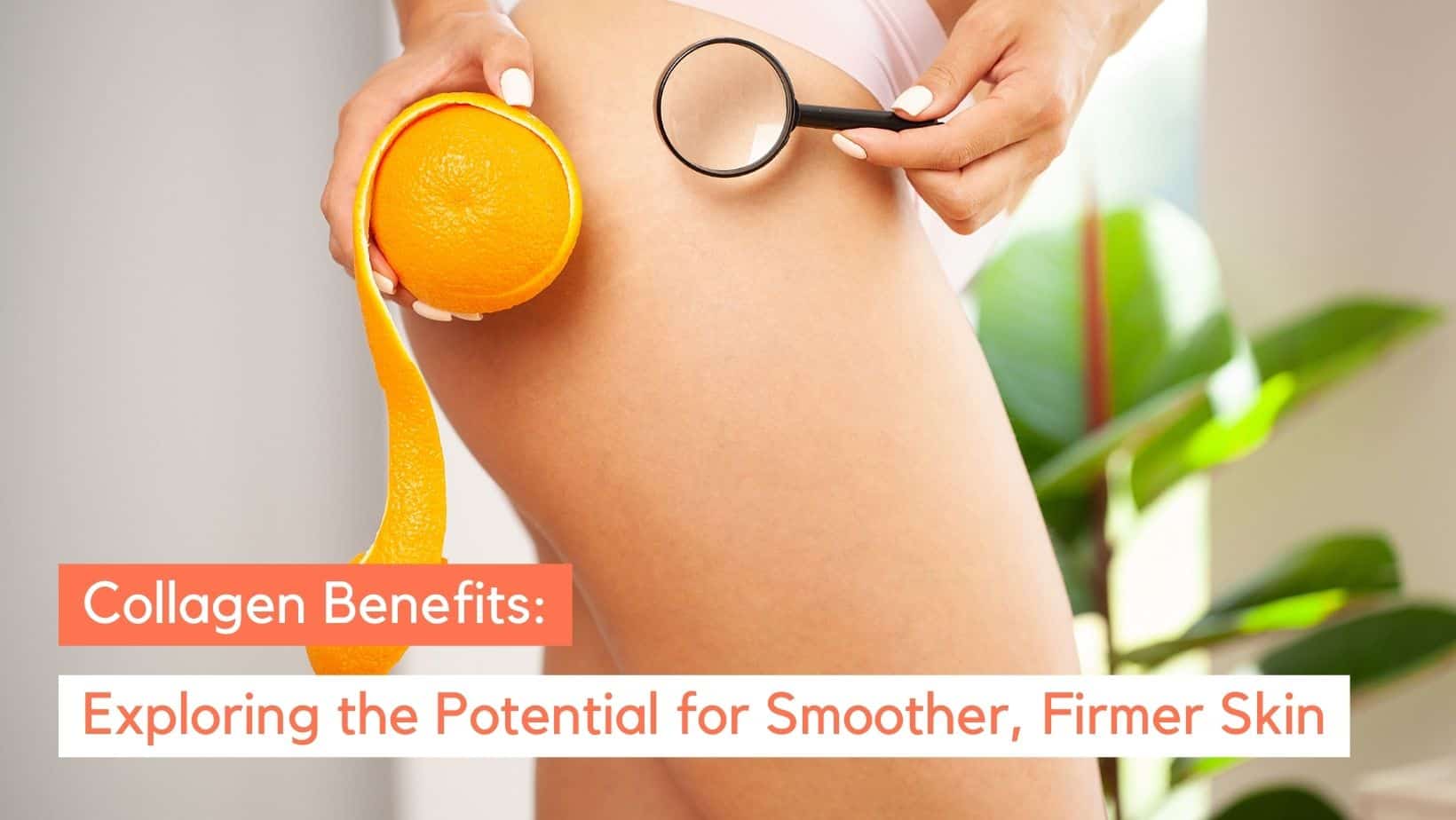Will Collagen Help Cellulite? The Potential for Smoother Skin
Are you tired of dealing with the unsightly appearance of cellulite on your skin? You’re not alone. Many people, especially women, struggle with this common issue and wonder, “Will collagen help cellulite?” The answer might surprise you.
Collagen is a crucial protein that helps maintain skin health and structure. As we age, our natural collagen production decreases, leading to a loss of skin elasticity and an increased likelihood of developing cellulite.
Ready to learn more about how collagen can help reduce the appearance of cellulite? Keep reading to discover the benefits of collagen supplements and how you can incorporate them into your daily regimen.
You’ll also learn about the importance of combining collagen with a balanced diet, regular exercise, and other skin care techniques for enhanced results.
Let’s get started.
Key Takeaways
- Collagen can help reduce cellulite by strengthening skin structure, retaining moisture, and improving elasticity.
- Taking collagen supplements daily, especially hydrolyzed collagen type I, can significantly reduce the appearance of cellulite over time.
- Combining collagen intake with a healthy diet, regular exercise, and other skin care techniques like dry brushing and massages can enhance results.
- Clean Sourced Organic Collagens Powder is a comprehensive supplement that offers five collagen types from four real food sources, along with added nutrients for increased bioavailability and potential benefits beyond cellulite reduction.
What Is Cellulite and Its Impact on Connective Tissue?
Cellulite is a widespread skin condition that results in a dimpled, uneven texture on the surface of the skin. It typically affects areas such as:
- buttocks,
- thighs,
- upper arms,
- abdomen,
- and breasts.
This harmless condition often becomes noticeable when there’s an accumulation of excess subcutaneous fat underneath the skin.
Higher body fat percentage in areas like the buttocks, thighs, and abdomen can contribute to the development of cellulite, especially in women who generally have a greater percentage of body fat compared to men.
Affecting over 90% of women and around 10% of men, cellulite represents a pervasive concern due to its effect on how the skin looks.
Although it does not necessarily reflect poor health habits or conditions, many people seek ways to minimize its appearance.
The bumpy look associated with cellulite emerges when stored fats press against connective tissues beneath the cutis, causing puckering visible from outside.
Women are more prone than men to this phenomenon because their fat compartments tend to expand upwards rather than outwards as they do in males.
The variation in distribution among fat cells and connective tissue makes women more susceptible visually speaking.
Various factors can influence whether someone develops cellulitis. These include genetic predisposition, hormonal fluctuations—particularly those related to estrogen, which promotes fatty deposits, especially in females.
Also, the symptoms can worsen post-menopause due to weakened vascular systems.
Lifestyle choices also play a role; a diet rich in processed foods high in sugars, salts, and preservatives can lead to toxin buildup in fat cells, deteriorating skin quality.
Managing body waste effectively through a healthy diet is crucial for maintaining skin health and reducing stress on adipose tissues.
It’s important to remember that despite being aesthetically undesired by some people, having cellulite doesn’t indicate an unhealthy lifestyle per se.
Habits like smoking significantly increase the risk of cellulite by amplifying the aforementioned effects.
Other behaviors, such as wearing snug clothing or experiencing weight fluctuations, can also contribute.
Fortunately, these factors are manageable.
Understanding the root causes of cellulite is critical if one aims to reduce its appearance naturally.
By targeting these underlying issues, you can take a more effective approach to minimizing unwanted skin texture changes.
How Collagen Affects Skin Structure and Elasticity

As a vital protein, collagen acts as the scaffolding for our body’s connective tissues such as:
- skin,
- bones,
- muscles,
- and tendons.
It plays an essential role in maintaining the resilience and health of our skin by not only replacing old and worn-out skin cells, but also aiding in creating new fibroblasts within the dermis, which leads to fresh cell growth.
As we grow older, the body’s collagen production diminishes. This reduction impacts the skin’s elasticity and density, resulting in thinner dermal layers that are more vulnerable to forming cellulite.
For women after menopause, the natural reduction in collagen production becomes more evident, resulting in increased visibility of cellulite.
Thankfully, studies show that taking collagen supplements may boost skin density, helping to diminish cellulite and improve skin health.
Enhanced levels of collagen contribute positively by:
- strengthening walls within the dermis,
- increasing its capacity to retain moisture,
- thickening overall structure,
- bolstering firmness, suppleness, and smooth texture,
- and minimizing dimpled manifestations commonly associated with cellulite.
Type I collagen is the most abundant form found in our bodies, making up about 90% of our collagen. It plays a crucial role in addressing cellulite concerns.
Can Collagen Help Reduce Cellulite Appearance?

Incorporating collagen into your regimen may contribute to diminishing the visibility of cellulite by reinforcing connective tissues, moisturizing skin, and enhancing its suppleness from within.
By restoring collagen in the body, one can achieve a more even skin texture, diminish the appearance of wrinkles, and augment collagen density in the dermal layer, all factors that could play a role in lessening signs of cellulite.
Bioactive collagen peptides are particularly effective in reducing the appearance of cellulite and improving skin elasticity from within.
Consuming daily doses of collagen peptides has been linked to sustaining adequate levels of this important protein within our bodies.
This ongoing intake is believed to aid not only in mitigating current states, but also in preventing the progression of cellulite conditions.
Evidence from research indicates that women consuming 2.5 grams per day over six months saw substantial improvements concerning their cellulites’ presence.
Specifically, women with moderate cellulite experienced clear improvements in skin appearance and density.
For optimal results with these supplements, continuity matters—it might take several weeks before noticeable changes become apparent.
To foster optimal skin vitality and potentially reduce the appearance of cellulite, it is beneficial to combine supplement strategies with nutritious dietary practices and regular physical activity routines.
This integrated approach should be part of an overall effective skincare regimen targeting the underlying structures associated with cellulite.
Hydrolyzed collagen types appear to hold the greatest potential for achieving desired outcomes related to improving skin texture and reducing cellulite.
Therefore, it is important to prioritize identifying and selecting the right form of collagen that suits your unique needs and preferences when deciding whether to include it in a personal skincare program.
Hydrolyzed collagen supplements, particularly those derived from fish, have shown promise in enhancing skin elasticity and firmness.
These supplements work by increasing collagen density within the dermal layers, which can help smooth out the dimpled appearance of cellulite.
Additionally, combining collagen intake with a balanced diet rich in antioxidants, vitamins, and minerals can further support skin health and improve overall complexion.
Regular exercise, especially routines that focus on strengthening and toning muscles, can also play a significant role in reducing cellulite.
Physical activities such as resistance training and cardiovascular exercises help improve blood circulation, which is crucial for maintaining healthy skin.
By promoting better blood flow, these exercises can aid in the reduction of cellulite and enhance the effectiveness of collagen supplements.
Incorporating topical treatments, such as anti-cellulite creams and serums, can provide additional benefits. These products often contain ingredients like caffeine, retinol, and essential oils that help tighten and firm the skin.
When used in conjunction with collagen supplements and a healthy lifestyle, topical treatments can contribute to a more even and smooth skin texture.
Overall, a comprehensive approach that includes hydrolyzed collagen supplements, a nutritious diet, regular exercise, and targeted topical treatments can significantly improve skin health and reduce the appearance of cellulite.
By addressing the root causes and supporting the skin’s natural structure, you can achieve a more youthful and vibrant complexion.
Clean Sourced Organic Collagens Powder: A Comprehensive Collagen Supplement
When searching for a collagen supplement to help reduce the appearance of cellulite, it’s important to consider products that offer a diverse range of collagen types and additional beneficial ingredients. One such supplement on the market is Clean Sourced Organic Collagens Powder.
This supplement contains five different collagen types (I, II, III, V, and X) sourced from four real food ingredients: beef, chicken, fish, and eggshell.
It also includes added vitamin C, B6, zinc, and silica, which are said to enhance the bioavailability of the collagen.
Clean Sourced Organic Collagens Powder is a fine, odorless, and tasteless powder that reportedly dissolves easily without clumping, making it convenient to add to various beverages or recipes.
Each serving provides 8 grams of complete protein, including tryptophan, while containing only 32 calories and zero grams of carbs or sugar.
Also, this collagen supplement offers several potential benefits, such as:
- reducing the appearance of fine lines and wrinkles,
- lubricating joints for improved mobility and comfort,
- promoting thicker hair and stronger nails,
- supporting cardiovascular health,
- boosting metabolism for weight management,
- and protecting the liver and enhancing gut health.
Clean Sourced Organic Collagens Powder also undergoes third-party testing to ensure the absence of glyphosate, heavy metals, and pesticides, which may provide peace of mind for those concerned about the purity and quality of their supplements.
As with any dietary supplement, it’s essential to remember that individual results may vary, and it’s always advisable to consult with a healthcare professional before starting a new supplement regimen.
Types of Collagen Peptides for Cellulite
Various forms of collagen supplements, such as peptides, powders, and creams, are available for consumption and topical application.
Using hydrolyzed multi-collagen powders can promote skin health and aid in cellulite reduction.
Collagen peptide supplements can help improve the appearance of cellulite by protecting the existing collagen in the body and preventing further deterioration.
Collagen-based anti-cellulite creams often incorporate stem cells and essential oils to boost skin hydration and enhance its elasticity.
Taking collagen pills has shown efficacy in increasing skin elasticity as well as diminishing the visibility of cellulite on the body.
Despite the benefits that topically applied products offer through supporting skin moisture levels, ingesting collagen typically yields more significant improvements by targeting the internal structure of the skin to alleviate indentations caused by cellulite.
These can be taken as part of a powdered supplement or included in foods like smoothies, yogurt, or beverages.
Collagen powder is a versatile ingredient that can be added to a variety of dishes, such as smoothies and soups, to provide a nutritional boost.
Best Practices for Taking Collagen
To minimize the appearance of cellulite, health professionals advise:
- Ingesting 10 to 20 grams of collagen peptides every day.
- Opting for hydrolyzed forms of collagen for better absorption. These can be taken as part of a powdered supplement or included in foods like smoothies, yogurt, or beverages.
- Taking collagen supplements on a daily basis will provide more noticeable benefits over time.
For optimal results with bioactive peptide supplements intended for skin health enhancement, it is recommended that you pair them with Vitamin C.
To boost Vitamin C levels and improve your body’s ability to absorb and synthesize collagen, consider consuming:
- Citrus fruits
- Strawberries
- Bell peppers
- Kiwifruit
By doing so, you’ll likely see greater improvements from using bioactive collagen peptide products.
Easy ways to add this beneficial protein into your diet include mixing its powder form into various recipes such as nutrient-packed smoothies or hearty soups.
Due to its adaptable nature, incorporating this supplemental powder doesn’t require significant dietary changes.
Another alternative way to get natural sources of the compound is through bone broth consumption.
Sticking with regular supplementation while adopting an overall well-rounded lifestyle that includes a balanced nutritional regimen enhances outcomes significantly.
In order to support skin health while utilizing these supplementary options, effectively reduce processed food intake and watch salt consumption within your daily eating habits.
Additional Natural Methods to Reduce Cellulite

Incorporating collagen supplements is one of various strategies that can aid in diminishing the visibility of cellulite.
To get rid of cellulite, consider various methods and tips including lifestyle changes, medical and non-medical treatments, and diet adjustments.
Here are some of the supplementary methods you can try:
- Engaging in regular physical activity.
- Adhering to a nutritious diet.
- Ensuring adequate hydration.
- Enhancing blood flow throughout the body.
Both resistance workouts and cardiovascular exercises play an integral role in tightening muscles and lowering fat deposits, which may contribute to making cellulite less noticeable.
Exercises aimed at strengthening your hamstrings, quadriceps, glutes, and hips can be especially effective.
Adopting a diet rich with fruits, vegetables, fiber, and antioxidants helps expel toxins from our system.
This detoxification process can lead to reduced prominence of those pesky cellulite dimples on the skin’s surface.
Incorporating healthy fats such as olive oil or avocado into your meals alongside nuts, grape seed oil seeds or heavy cream could potentially assist in this reduction effort too.
Maintaining proper fluid intake is crucial for promoting good skin health. It’s suggested that women consume water around 11.5 cups and men consume 15.5 cups daily for optimal hydration.
To encourage better circulation within your body—which also impacts how visible your cells appear—consider engaging in practices like dry brushing along with receiving massages or participating in particular yoga sessions catered towards boosting circulatory functions.
Dry Brushing: A technique designed not only to exfoliate but also to stimulate enhanced blood circulation thus improving appearance-related issues linked to superficial lumps beneath our epidermis layer.
Massages: By facilitating lymphatic drainage plus stretching out tissues under our dermal layers, massage therapies have shown promise as another way to diminish traces left behind by unwanted lump formations often associated with fatty clusters trapped underneath the outermost lining found over muscles themselves.
Specific Yoga Poses & Series: When done correctly, certain postures known within the yogic community have been seen in favorable regards helping practitioners enhance their internal systems responsible for the efficient distribution of nutrients/oxygenated cells throughout human anatomy.
By incorporating these activities into a regular lifestyle routine, anyone looking to maintain a healthy weight while reducing mild cellulite can notice improvements over time.
These activities can help smooth out areas where cellulite is typically visible, regardless of age, gender, or overall condition.
This holistic approach supports the health of the skin, which is our largest organ and contributes to overall wellness and personal well-being.
Potential Risks and Side Effects of Collagen Supplements
While collagen supplements are largely considered safe, some people might experience slight adverse effects.
It’s important to be aware of possible reactions when starting a new supplement routine.
Consulting with a healthcare provider is recommended before adding collagen to your daily intake, particularly for those with allergies or existing health conditions.
Ingredients like herbal extracts found in certain collagen supplement products can interact negatively with prescription medications.
These supplements may contain excessive amounts of vitamins like biotin that could disrupt results during heart and thyroid function tests.
If you have specific food allergies, such as an allergy to fish or shellfish, it’s crucial to scrutinize the ingredient list on labels of collagen supplements closely for any hidden allergens.
Pregnant or nursing women should seek medical advice prior to taking a collagen supplement due to their composition which may include ingredients that pose potential risks.
Summary
In summary, cellulite is a common skin condition that affects many people, especially women.
Collagen, a crucial protein for skin structure and elasticity, can play a significant role in reducing the appearance of cellulite.
By strengthening connective tissues, hydrating the skin, and improving its elasticity, collagen supplements can help smooth out those stubborn dimples.
Combining collagen supplementation with a healthy diet, regular exercise, and additional natural methods can lead to significant improvements in skin appearance.
Consistency is key, and consulting a healthcare provider before starting any new supplement regimen is always a good idea.
Take the first step towards smoother skin and give collagen a try!
Frequently Asked Questions
Can collagen help reduce cellulite?
Yes, by enhancing connective tissues and boosting skin elasticity, collagen is capable of diminishing cellulite.
Incorporate collagen into your regimen for skincare to possibly reap these benefits.
What type of collagen is best for cellulite?
Hydrolyzed fish collagen of type I stands out as the premier choice for combating cellulite, proving to be particularly potent in addressing this concern.
How much collagen should I take daily to reduce cellulite?
To aid in diminishing cellulite, it is suggested that you ingest between 10 to 20 grams of hydrolyzed collagen each day.
For optimum outcomes, ensure to maintain this daily intake of collagen at the recommended levels.
Are there any side effects of taking collagen supplements?
Collagen supplements are considered safe.
Minor side effects might occur for some people. It is advisable to seek advice from a healthcare professional before beginning any supplementation with collagen.
What additional methods can help reduce cellulite naturally?
Incorporating techniques like dry brushing and massages into your regimen, alongside consistent exercise and maintaining a healthy diet, can also aid in naturally reducing cellulite.
It’s beneficial to include these practices for optimal outcomes.



Comments